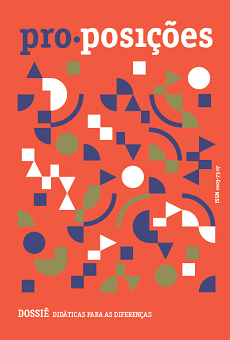Resumo
É sempre num sentido substancialista que compreendemos a noção de diferença: diferenças existiriam, seriam dadas, e nossa responsabilidade estaria em nos adaptarmos a elas. Quer se valorizem, quer se critiquem nossas sociedades pós-modernas, elas parecem situar no cerne de suas atenções a preocupação com as diferenças individuais. O objetivo deste artigo é considerar essa valorização e essa crítica, sem privilegiar uma ou outra. Tomando apoio em Montaigne, procura mostrar que o indivíduo não é assimilável a uma realidade substancial e estável, e que, se quisermos refletir sobre o que seria, na educação, a preocupação com a individualidade, é outra a direção que deveremos tomar. O que seria, assim, uma “educação principesca”, a admitirmos que esse tema clássico da filosofia da educação seja o tema em que a filosofia reflete essa preocupação com o indivíduo, com Montaigne particularmente, mas também com Emerson, Nietzsche, Dewey e, mesmo, Kant? Em que medida, além disso, a educação do indivíduo assim compreendida se articula com a preocupação com a cultura e as suas obras, a ponto de permitir nossas condi- ções de subjetivação?
Abstract
It’s always in a substantialist way, that we understand the notion of difference: there would be differences, they would be given, and our responsibility is to adapt to them. Whether we like it or dislike our postmodern societies, they seem to put at the heart of their projects this concern for individual differences. The purpose of this article is to contest both the valuation that this criticism. Building on Montaigne, it endeavors to show that the individual is in no way comparable to a substantial and stable reality and if we want to think about what may be the concern of individuality in the éducation, we must take an other direction. What is a “princely education” if we admit that this classic theme of philosophy of education is the theme in which philosophy reflects this concern for the individual, especially in Montainge, but also Emerson, Nietzsche, Dewey, and even Kant? To what extent then, the education of the individual, such understood, can be articulated with culture and his works, to allow us our conditions of subjectivation?
Keywords: Paulo Freire, school education, democracy
Referências
Boltansky, L., & Chiapello, È. (1999). Le nouvel esprit du capitalisme. Paris: Gallimard.
Deleuze, G. (1968). Différence et répétition. Paris: PUF.
Dewey, J. (1970). L’école et l’enfant. Neuchâtel: Delachaux et Niestlé.
Dewey, J. (2011). Education et démocratie. Paris: Armand Colin.
Ehrenberg, A. (2010). La société du malaise. Paris: Odile Jacob.
Emerson, R. W. (2000). La confiance en soi (Essays, 1841-1844). Paris: Petite Bibliothèque, Payot & Rivages.
Johsua, S. (1999). L’école entre crise et refondation. Paris: La dispute.
Kambouchner, D. (1995). Notions de philosophie, tome 3 (Collection Folio Essais, n. 279). Paris: Gallimard.
Kant, E. (1993). Réflexions sur l’éducation. Paris: Vrin.
Lahire, B. (1993). Tableaux de famille (Hautes études). Paris: Gallimard; Éditions du Seuil.
Lyotard, J.-F. (1979). La condition postmoderne. Paris: Minuit.
Montaigne, M. (1992). Les Essais. Évreux: Arléa.
Nietzsche, F. Le gai savoir. Paris: Gallimard, 1982.
Vincent, H. (2012). Le peuple enfant et l’école: pourquoi pas Alain ? Paris: L’Harmattan.
Vincent, H. (2013). Habitudes et/ou discipline. In A. Firode, J.- F. Goubet, & H. Vincent (Dir.), Les disciplines de pensée (pp. 107-126). Arras: Artois Presses Université.
A Proposições utiliza a licença do Creative Commons (CC), preservando assim, a integridade dos artigos em ambiente de acesso aberto.

